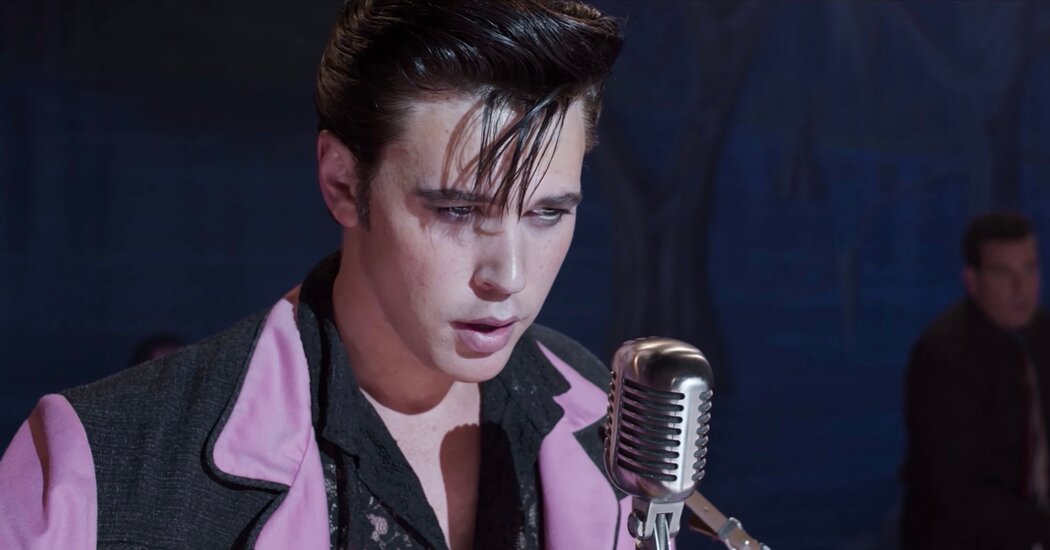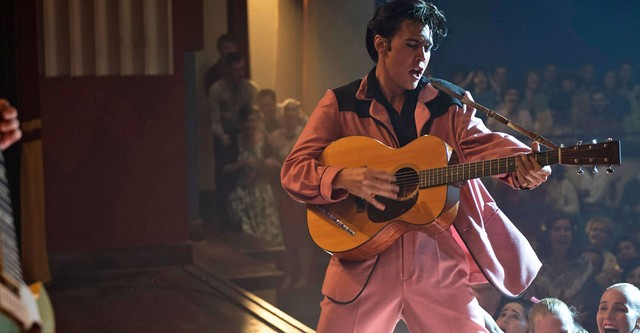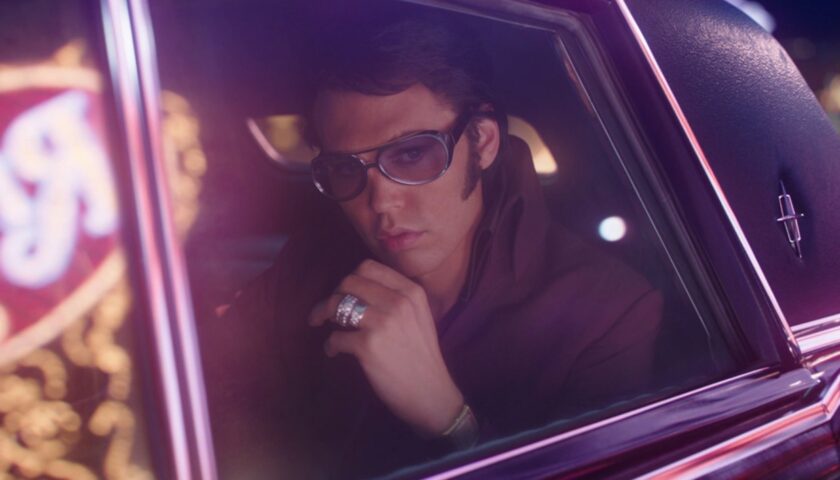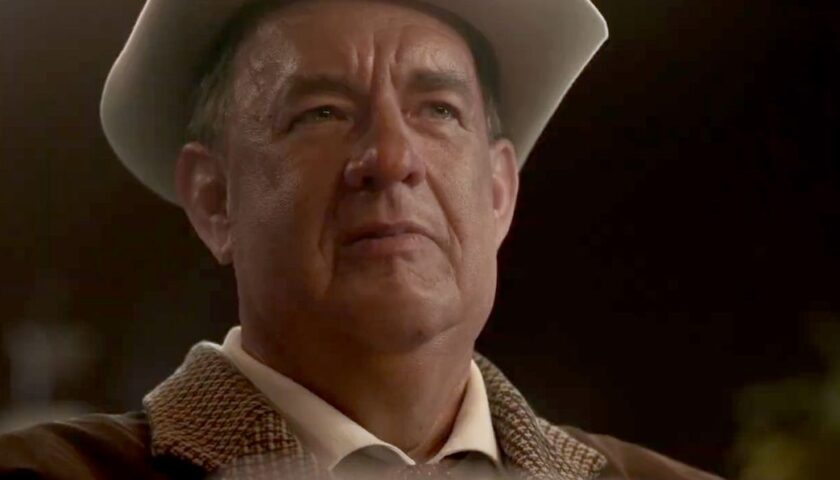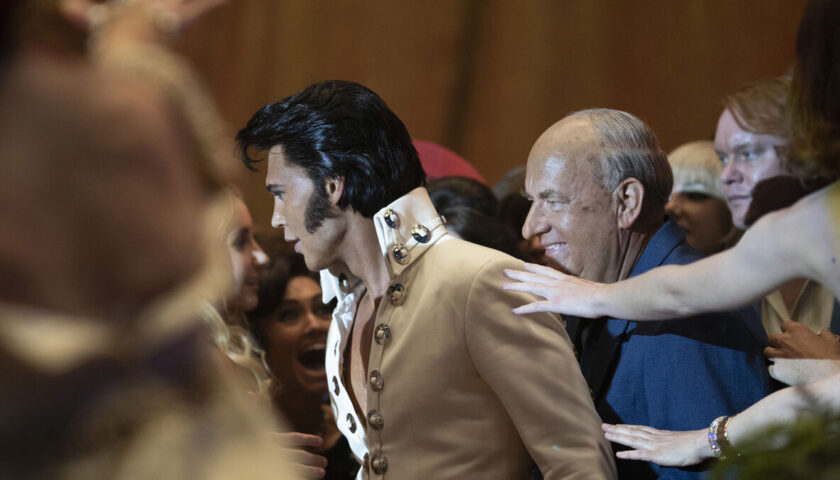“Elvis” (2022) – Elvis Aaron Presley.
The King of Rock and Roll.
He shook his hips and “rattled and rolled” to Earth-shattering success in the 1950s. He coped with some career dips, but The King “couldn’t help falling in love” with new triumphs – beginning in 1969 – in Las Vegas. He sold millions of records and inspired worldwide audiences, and his towering, legendary mark remains Herculean, even 45 years after his death, Aug. 16, 1977 at just 42.
Fearless filmmaker Baz Luhrmann – who embraces bold, boisterous projects like “Moulin Rouge!” (2001) and “The Great Gatsby” (2013) – recruited a (now) 30-year-old Austin Butler and an 85 million-dollar budget for a big-time, big-screen Elvis biography that, quite frankly, looks twice as expensive as the said finances.
Luhrmann watched Elvis movies growing up and spoke with “CBS Mornings” on June 16, 2022 to explain his motivations for this royal exploration.
“I always thought if you want to look at America in the 50s, 60s, and the 70s, (Elvis has) this great way of exploring (the time), because he’s there, one way or the other, the good, the bad, the ugly. It (was) only when I thought about the idea of Col. Tom Parker. The sell and the soul. That’s America. That’s what I wanted to explore,” Luhrmann said.
Baz, indeed, dives into Parker and Presley’s business relationship from Elvis’ beginnings during a 1954 Louisiana Hayride appearance to his 1970s Vegas swan song.
“Elvis” travels a sprawling 23 years of the man’s career, and even though the runtime clocks at 159 minutes, most of the movie feels rushed. Not hurried during individual moments, but the picture feels like a run-through of Elvis’ greatest highlights, almost like a reel.
Although, sometimes…a glorious, fabulous reel.
Butler is a dead-ringer for The King, and he never falters, not even for a second. He looks, speaks, and sings like Elvis and graces the screen with raw power and sex appeal, especially when donning a pink suit during his Hayride debut, as young women scream, screech, and squeal.
Luhrmann captures wide shots, closeups, and every angle in between during the three-minute sequence where Butler showcases Elvis’ God-given charisma, musical gifts, and twists and shouts.
It’s here that Col. Tom Parker (Tom Hanks) – an overweight, almost-50, small-time music promoter with carnival barker vibes – discovers EP. Parker’s business know-how (that he refers to as snow jobs or “snow”) and Presley’s allure and talent catapult them to mountains of riches and one Graceland.
From here, the narrative zips, stops, fast-forwards, and momentary pauses through a collection of vivid memories. Through most of the first two acts, we get snippets of conversations with Elvis’ mom (Helen Thomson), dad (Richard Roxburgh), B.B. King (Kelvin Harrison Jr.), the Memphis Mafia, and Priscilla (Olivia DeJonge).
However, other than Vernon’s (Roxburgh) passive management style, we don’t learn a lot of substance from his family or B.B. DeJonge’s Priscilla doesn’t offer much insight into their relationship. She only seems to exist on-screen to draw physical likenesses between the actress and the famous spouse.
We randomly see Elvis drive his pink Cadillac, loiter around his Memphis home, and listen to the Colonel’s money-making ideas, like a cinematic version of news B-roll. Fragments of images act as fillers. There’s an emotional distance between the events on-screen and the audience (or at least this critic). Luhrmann and cinematographer Mandy Walker capture glorious, vibrant images (even on a regular ol’ tour bus), but several middling exchanges are sadly highlighted by a running timeline of infamous 1960s deaths.
However, I “don’t want to be cruel” and bury this movie because the third act comes alive by finally slowing down to feature the intricacies of two massive Elvis accomplishments: his NBC Comeback Special and Vegas residency. Rather than do-si-do around Parker’s song and dance, Elvis challenges him but also falls for his snow.
The Vegas saga may last 50 minutes of screen time, and the big-band production highs and the notorious lows fascinate and delve into Elvis’ health setbacks and economic knots. (Next time, please set the entire movie in Vegas.)
Yes, Baz explores “the sell and the soul,” and The Colonel narrates the picture, which is a curious choice, but then, Elvis recounting his own story seems a bit presumptuous.
Still, Hanks donning a “fat suit” and channeling Parker’s view of the 23-year ride seems misplaced to truly discover Elvis. Perhaps that distance is appropriate, but we certainly secure a front-row seat of Butler’s spectacular work, including his actual singing. Sometimes on his own. Other times, The King’s voice (from the grave) accompanies him.
Austin gives a heroic performance, and Baz delivers on his vision. During key points, you’ll undoubtedly feel “all shook up,” but “Elvis” could have used “a little less conversation.”
Maybe a lot less.
⭐⭐ 1/2 out of ⭐⭐⭐⭐
Directed by: Baz Luhrmann
Written by: Baz Luhrmann, Sam Bromell, Craig Pearce, and Jeremy Doner
Starring: Austin Butler, Tom Hanks, Olivia DeJonge, Helen Thomson, Richard Roxburgh, and Kelvin Harrison Jr.
Runtime: 159 minutes
Rated: PG-13
Image credits: Warner Bros.

